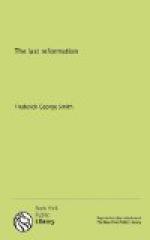Such a movement and such a standard of church relationship require the elimination of all ideas of priestly ecclesiasticism. The Christ of the New Testament church is not an absent Christ. He has never resigned his position as head of the church and vested the governmental authority in a self-perpetuating clerical caste. His government is theocratic. He administers it himself through his Holy Spirit. Hence no men or set of men can confer any power or authority whatsoever upon any individual to act for Christ. Christ calls his own assistants, and any man unto whom the Word of the Lord comes is divinely authorized to proclaim His message. The only sphere of human operation respecting this administration of divine government is simple recognition of what God has done, and this recognition in the last analysis belongs to the whole body of God’s people. The basis of every man’s authority and responsibility is, therefore, not human appointment or official position, but the divine call, gifts, and qualifications, that he possesses. If, for example, he is called to apostolic work and endowed with gifts and qualifications fitting him for such service, he has apostolic authority and responsibility, and there is nothing for other ministers or Christians to do but to recognize what God has done. “Now hath God set the members every one of them in the body, as it hath pleased him” (1 Cor. 12:18). Such, in short, is the divine organization and government.
[Sidenote: What of the future?]
The realization of this grand ideal of the restoration of the New Testament standard of church membership, government, and authority, is impossible within the sect system. For the sects to turn all the people of God loose from subjection to every foreign yoke and make them free to associate without restriction with all the saved of God, would be an act of suicide. Only by division and by holding the grasp of ecclesiastical rule can sects survive. But he is blind to the signs of the times who can not see that the grip of ecclesiasticism is slipping and the bonds of true catholicity becoming strengthened. The true people of God are becoming more and more dissatisfied with present conditions and are beginning to think in terms of a universal Christianity. The rising tide of evangelism among such is already beginning to overflow the lines of sect. What may we expect in the future?
Things can not continue as they have been in the ecclesiastical world. A sweeping reformation is imperative and imminent. In fact, the vanguard of this great movement is already visible. What will the future bring forth? Will the sects themselves fade away and gradually become dissolved? or will the powers that rule in the ecclesiastical world finally set themselves against the spirit of catholicity and thus practically force the true people of God to ignore absolutely all sectarian lines and step out on the broad platform of truth and universality, united in Christ alone, knowing no head but Christ and no creed but His truth? Who can tell?




